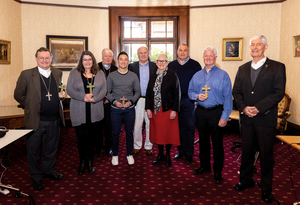01 Nov 2021
BISHOP: Listening with hope and commitment
The Southern Cross November 2021

Greg O’Kelly SJ
Recall that more than 200,000 people joined discussion groups in preparation for the Plenary Council, and from these groups came 17,000 suggested items for consideration.
What a formidable exercise of trust, to attempt a nationwide gathering by electronic means of a significant cross section of the Australian Catholic people.
It was a journey that started some years ago when the bishops called for the Year of Grace.
As a Church we needed to listen to where and how, and through whom, God was calling us. Our Church was battered by the abuse crisis, had to come to terms with pastoral care for the survivors, was witnessing how distanced from the parish Eucharist communities our young people have become, how some or many of our structures were making proper lay participation in Church governance dishearteningly difficult, especially for women, how we needed to respond to the frequent calls of Pope Francis for a listening Church of missionary disciples, a Church that was inclusive of all, especially those on the edges.
The first impressive experience of the Plenary Council was, despite the huge challenge of distance, the number of people involved; from all around the country, some 300, including the associated advisors.
They were young(ish) and old, black and white, Euro and Asian and Hispanic and African, a kaleidoscope of Australia.
Quite movingly, considering the story of dispossession, each speaker identified the Aboriginal land from which they were speaking.
The number of young(ish) speakers and women was in high proportion.
People were free to make their own personal interventions, and almost 300 did so over the six days, with several of those going “live” each morning.
Listening attentively to each contribution in the feedbacks and group meetings was stressed, and frequent pauses made to encourage this.
The lament and day of listening to the victims of abuse evoked deep feeling.
Governance structures for dioceses and parishes, priestly formation, the role of women, care for the environment, concern for active involvement for asylum seekers, the demand for greater effort to ensure the Catholic identity of our schools, the need for greater inclusion of the First Australians in the profile of the Church, openness to alternative communities, including LGBTQ+, were themes raised often.
It was interesting and instructive how few of the 40 bishops spoke in the general meetings (as opposed to the smaller group meetings where there was frequent contribution). It was if we were making sure that the people and clergy had time to have their say, and we must take seriously the need to listen. I know that was the deliberate approach adopted by many of the bishops, and I think that is a good sign, as the bishops must listen before they vote.
All in all, I believe, we came away after this experience of our Church in Australia as men and women of hope and commitment.
No resolutions were proposed for voting, as that is a function for the second phase of the Council in July 2022. In the meantime working groups proposed by the members are asked to help undertake the work of refining these proposals. If the launching of the first phase of the Council was a formidable task, one for which the organisers must be loudly praised, it remains the case for the second phase also, and therefore let us continue to pray for the grace of listening to the Holy Spirit present in our midst.
Emeritus Bishop Greg O’Kelly SJ is the former Bishop of Port Pirie Diocese.
PARTICIPANTS: Pictured at West Terrace on the first day of the Plenary Council assembly, from left, Archbishop Patrick O’Regan, Claire Victory, Bishop Greg O’Kelly SJ, Julian Nguyen, Ian Cameron, Monica Conway, John Lochowiak, Fr Philip Marshall and Bishop Eugene Hurley. Picture: Ben Macmahon
